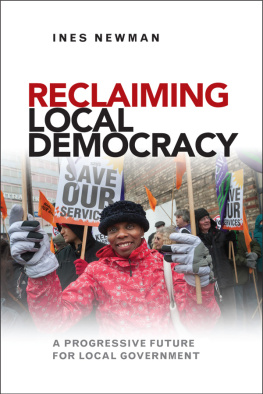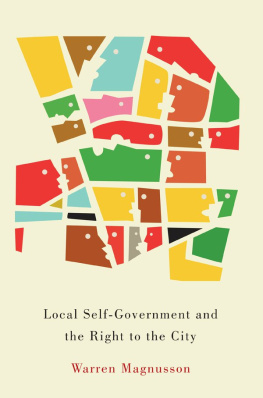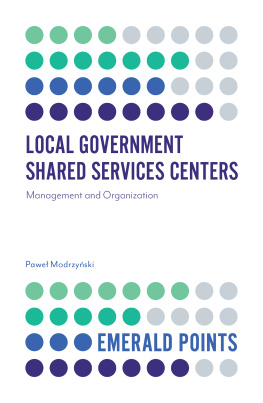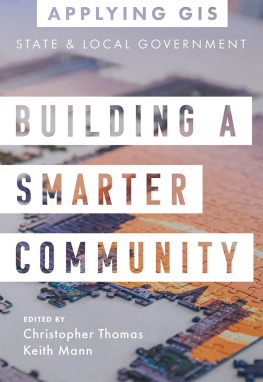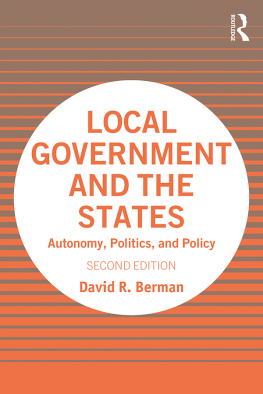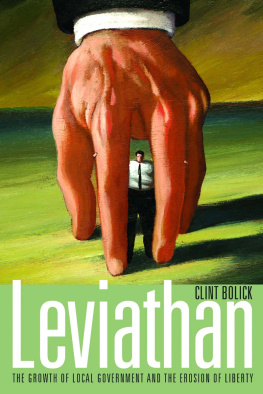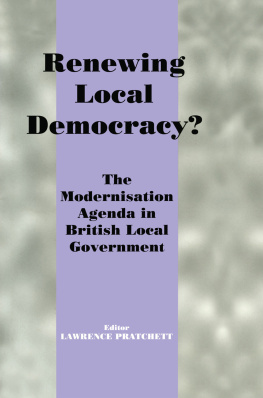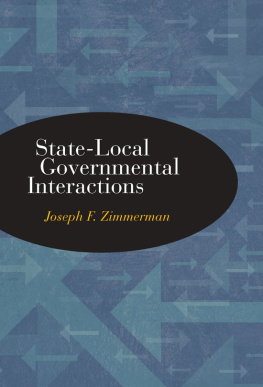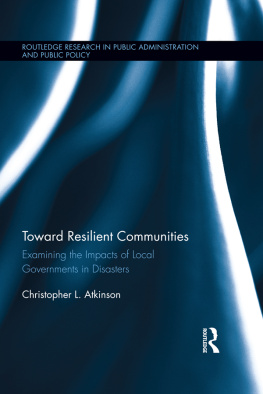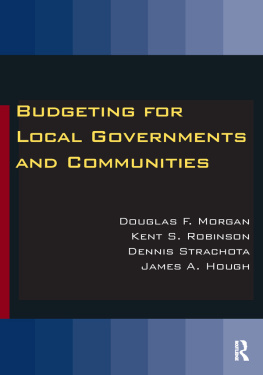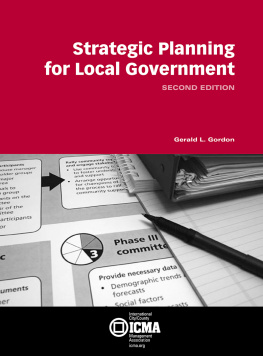RECLAIMING LOCAL DEMOCRACY
A progressive future for local government
Ines Newman
First published in Great Britain in 2014 by
Policy Press University of Bristol 6th Floor Howard House Queens Avenue Clifton Bristol BS8 1SD UK Tel +44 (0)117 331 5020 Fax +44 (0)117 331 5367 e-mail
North American office: Policy Press c/o The University of Chicago Press 1427 East 60th Street Chicago, IL 60637, USA t: +1 773 702 7700 f: +1 773-702-9756 e:
Policy Press 2014
British Library Cataloguing in Publication Data
A catalogue record for this book is available from the British Library
Library of Congress Cataloging-in-Publication Data
A catalog record for this book has been requested
ISBN 978 1 44731 218 5 epub
ISBN 978 1 44731 219 2 Kindle
The right of Ines Newman to be identified as author of this work has been asserted by her in accordance with the 1988 Copyright, Designs and Patents Act.
All rights reserved: no part of this publication may be reproduced, stored in a retrieval system, or transmitted in any form or by any means, electronic, mechanical, photocopying, recording, or otherwise without the prior permission of Policy Press.
The statements and opinions contained within this publication are solely those of the author and not of the University of Bristol or Policy Press. The University of Bristol and Policy Press disclaim responsibility for any injury to persons or property resulting from any material published in this publication.
Policy Press works to counter discrimination on grounds of gender, race, disability, age and sexuality.
Cover design by Andrew Corbett
Front cover: image kindly supplied by Corbis Images
Readers Guide
This book has been optimised for PDA.
Tables may have been presented to accommodate this devices limitations.
Image presentation is limited by this devices limitations.
Ines Newman provides a thoughtful and trenchant analysis rooted in her longstanding experience and commitment to local democracy and local government.
Lucy de Groot, Chief Executive of Community Service Volunteers and previously Executive Director of IDeA
I very much enjoyed reading this book. It gives councillors a rare opportunity to raise our heads and look beyond the foothills.
Cllr Roger Lawrence, Leader of Wolverhampton City Council
Rich with practical examples and proposals, this provocative new text asks what should local government do?. Moving beyond technical fixes, Newman argues that local government has an obligation to promote social justice. The book shows how a more proactive and inclusive local democracy can generate creative responses to meeting social need. A must-read for practitioners and academics alike.
Vivien Lowndes, Professor of Public Policy, University of Nottingham
To our grandchildren who are already asking the challenging ethical questions.
Contents
I could not have written this book without the considerable support I have received from very generous colleagues and from my family. Of course, the final product, any mistakes and weaknesses are my responsibility, but there is no doubt that those who have helped me have made this a better book.
My first thanks go to my colleagues who invited me to participate in their Marxist reading group when I joined the University of Warwick (Jonathan Davis, Crispin Fuller, Mike Geddes and Madeleine Wahlberg). I would not call myself a Marxist, but the stimulating discussions in this group helped to reawaken my interest in ideas and theories and made me read the literature that provided a background to this book. Jonathan, furthermore, facilitated my appointment as a Visiting Senior Research Associate at De Montfort University, providing an essential academic base for the research, and I am grateful to the university for its support. Second, I would like to thank the four anonymous reviewers of my original book proposal and the anonymous reviewer of the typescript, all of whom made helpful suggestions for improvement.
Particular thanks go to Janet Newman. Janet is no relation, but an academic for whom I have the highest regard. She gave invaluable advice on the original book proposal and read the first draft, quickly identifying some core weaknesses and helping me to address them. The first draft was also read by Marjorie Mayo, John Stewart and Councillor Roger Lawrence. Each of them provided really useful criticism, guidance and encouragement and contributed to improving the book. Roger read the book despite having a massive workload as leader of Wolverhampton in a period of austerity and cuts. His dedication to the city has delivered one of the most progressive councils in the UK. John Stewart originally inspired me when I did my MBA at Inlogov in the early 1990s. The course was a formative experience both as a result of the quality of the teaching and the stimulation from the student body. I loved it! John took the time to read the draft very thoroughly and made the type of gentle, perceptive and thoughtful comments for which he is well known. Marj is a very dear friend and provided general support, as well as invaluable advice on the proposal and the first draft.
Several friends and colleagues have also provided me with ideas and assistance with the case studies in the boxes that illustrate the text, and helped by discussing the book with me. Thanks go to: Janet Sillett and Alan Walters at the Local Government Information Unit (LGiU); Jane Foot, whose work on asset-based approaches and discussions with me provided all kinds of leads; Mandy Cooke, who is one of our Thursday walking group where the book was discussed; Pete Challis at Unison, who is a fund of reliable knowledge on financial and housing information; Dexter Whitfield, who founded the Centre for Public Services in 1973 and has worked unstintingly and consistently to protect the concept of public and promote citizen and worker engagement in public services; and Fiona Campbell, whose expertise on health inequalities and public health is exceptional. My job at LGiU brought me in to contact with a group of colleagues whose understanding of local government is outstanding. I was honoured to work with them and to learn from them. Other experts helped me via email correspondence: Allan Cox from the Department of Communities and Local Government, who clarified the statistical information on public sector procurement from the private sector; David Hall, Director of the Public Services International Research Unit, who helped me on international work on outsourcing; Mark Bramah from the Association for Public Service Excellence (APSE) who provided a wealth of information and case studies; Stuart Roden, regional organiser from Unison, who provided information on Cornwalls outsourcing; Melanie Oliver from Nesta, who provided information on their Creative Councils programme; Kathryn Rees, who updated the information I had on the Wigan social care case study; Peter Davies, who similarly updated the information on Monmouthshire County Council; and Chris Grey, whose little book on studying organisations is excellent and who helped me on management theory. Finally, Geoff Mulgan in many ways stimulated this book. He chaired a seminar, around 200002, on localism as defined by the New Local Government Network (NLGN), which I strongly criticise in this book. Having listened to the presentation and the discussion, I exclaimed: But the purpose of local government is to provide for need. Geoff, as I remember it, replied: You cant say that, Ines need is a relative concept. This book is a riposte to that comment. Geoff himself no longer believes that need is a relative concept, as he kindly told me when I wrote to him, referring me to the Young Foundations 2009 publication, Sinking and swimming: understanding Britains unmet needs .

